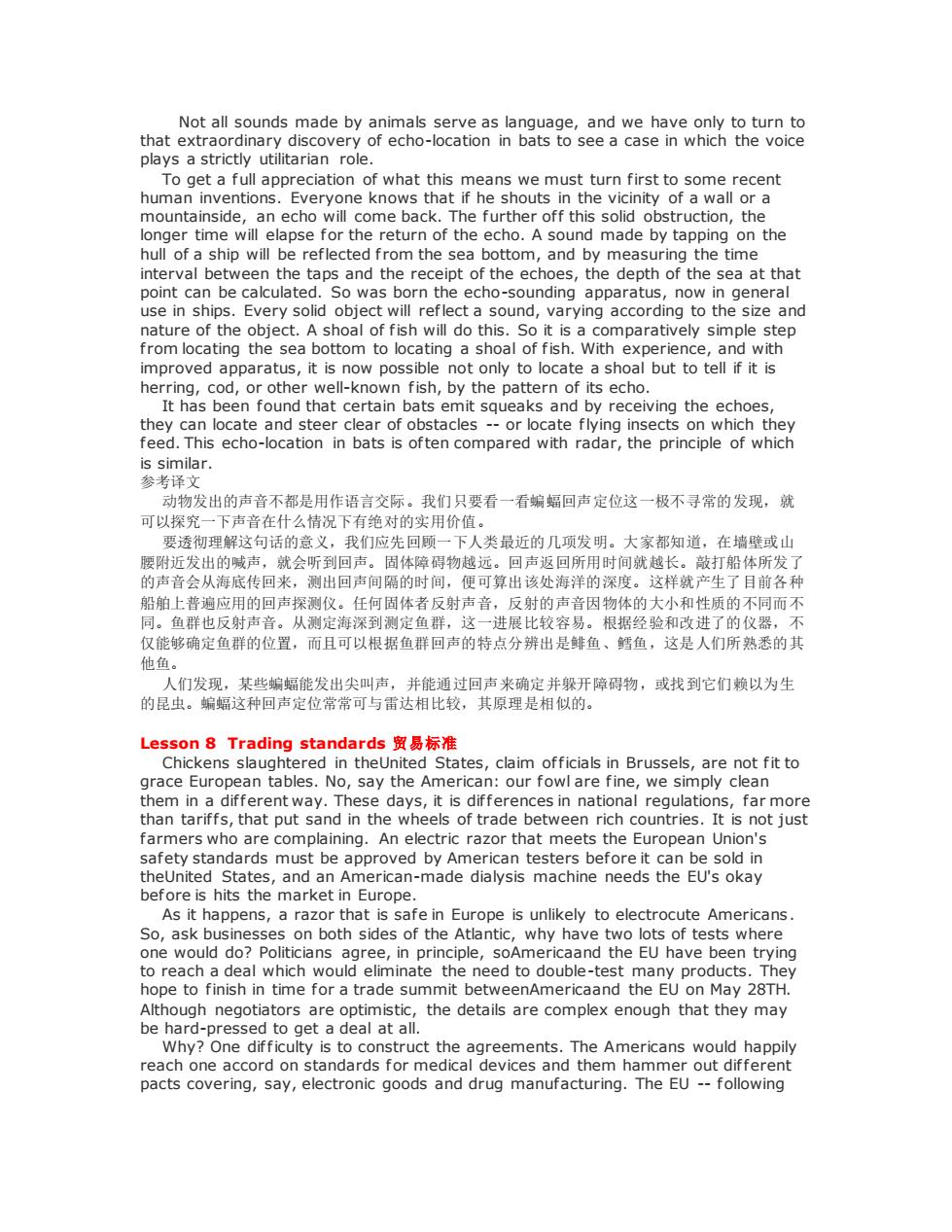正在加载图片...

Not all sounds made by animals serve as language,and we have only to turn to that extraordinary discovery of echo-location in bats to see a case in which the voice plays a strictly utilitarian role. To get a full appreciation of what this means we must turn first to some recent human inventions.Everyone knows that if he shouts in the vicinity of a wall or a mountainside,an echo will come back.The further off this solid obstruction,the longer time will elapse for the return of the echo.A sound made by tapping on the hull of a ship will be reflected from the sea bottom,and by measuring the time interval between the taps and the receipt of the echoes,the depth of the sea at that point can be calculated.So was born the echo-sounding apparatus,now in general use in ships.Every solid object will reflect a sound,varying according to the size and nature of the object.A shoal of fish will do this.So it is a comparatively simple step from locating the sea bottom to locating a shoal of fish.With experience,and with improved apparatus,it is now possible not only to locate a shoal but to tell if it is herring,cod,or other well-known fish,by the pattern of its echo. It has been found that certain bats emit squeaks and by receiving the echoes, they can locate and steer clear of obstacles --or locate flying insects on which they feed.This echo-location in bats is often compared with radar,the principle of which is similar. 参考译文 动物发出的声音不都是用作语言交际。我们只要看一看蝙蝠回声定位这一极不寻常的发现,就 可以探究一下声音在什么情况下有绝对的实用价值。 要透彻理解这句话的意义,我们应先回顾一下人类最近的几项发明。大家都知道,在墙壁或山 腰附近发出的喊声,就会听到回声。固体障碍物越远。回声返回所用时间就越长。敲打船体所发了 的声音会从海底传回来,测出回声间隔的时间,便可算出该处海洋的深度。这样就产生了目前各种 船舶上普遍应用的回声探测仪。任何固体者反射声音,反射的声音因物体的大小和性质的不同而不 同。鱼群也反射声音。从测定海深到测定鱼群,这一进展比较容易。根据经验和改进了的仪器,不 仅能够确定鱼群的位置,而且可以根据鱼群回声的特点分辨出是鲱鱼、鳕鱼,这是人们所熟悉的其 他鱼。 人们发现,某些蝙蝠能发出尖叫声,并能通过回声来确定并躲开障碍物,或找到它们赖以为生 的昆虫。蝙蝠这种回声定位常常可与雷达相比较,其原理是相似的。 Lesson8 Trading standards贸易标准 Chickens slaughtered in theUnited States,claim officials in Brussels,are not fit to grace European tables.No,say the American:our fowl are fine,we simply clean them in a different way.These days,it is differences in national regulations,far more than tariffs,that put sand in the wheels of trade between rich countries.It is not just farmers who are complaining.An electric razor that meets the European Union's safety standards must be approved by American testers before it can be sold in theUnited States,and an American-made dialysis machine needs the EU's okay before is hits the market in Europe. As it happens,a razor that is safe in Europe is unlikely to electrocute Americans So,ask businesses on both sides of the Atlantic,why have two lots of tests where one would do?Politicians agree,in principle,soAmericaand the EU have been trying to reach a deal which would eliminate the need to double-test many products.They hope to finish in time for a trade summit betweenAmericaand the EU on May 28TH. Although negotiators are optimistic,the details are complex enough that they may be hard-pressed to get a deal at all. Why?One difficulty is to construct the agreements.The Americans would happily reach one accord on standards for medical devices and them hammer out different pacts covering,say,electronic goods and drug manufacturing.The EU --followingNot all sounds made by animals serve as language, and we have only to turn to that extraordinary discovery of echo-location in bats to see a case in which the voice plays a strictly utilitarian role. To get a full appreciation of what this means we must turn first to some recent human inventions. Everyone knows that if he shouts in the vicinity of a wall or a mountainside, an echo will come back. The further of f this solid obstruction, the longer time will elapse for the return of the echo. A sound made by tapping on the hull of a ship will be reflected f rom the sea bottom, and by measuring the time interval between the taps and the receipt of the echoes, the depth of the sea at that point can be calculated. So was born the echo-sounding apparatus, now in general use in ships. Every solid object will reflect a sound, varying according to the size and nature of the object. A shoal of fish will do this. So it is a comparatively simple step f rom locating the sea bottom to locating a shoal of fish. With experience, and with improved apparatus, it is now possible not only to locate a shoal but to tell if it is herring, cod, or other well-known fish, by the pattern of its echo. It has been found that certain bats emit squeaks and by receiving the echoes, they can locate and steer clear of obstacles -- or locate flying insects on which they feed. This echo-location in bats is of ten compared with radar, the principle of which is similar. 参考译文 动物发出的声音不都是用作语言交际。我们只要看一看蝙蝠回声定位这一极不寻常的发现,就 可以探究一下声音在什么情况下有绝对的实用价值。 要透彻理解这句话的意义,我们应先回顾一下人类最近的几项发明。大家都知道,在墙壁或山 腰附近发出的喊声,就会听到回声。固体障碍物越远。回声返回所用时间就越长。敲打船体所发了 的声音会从海底传回来,测出回声间隔的时间,便可算出该处海洋的深度。这样就产生了目前各种 船舶上普遍应用的回声探测仪。任何固体者反射声音,反射的声音因物体的大小和性质的不同而不 同。鱼群也反射声音。从测定海深到测定鱼群,这一进展比较容易。根据经验和改进了的仪器,不 仅能够确定鱼群的位置,而且可以根据鱼群回声的特点分辨出是鲱鱼、鳕鱼,这是人们所熟悉的其 他鱼。 人们发现,某些蝙蝠能发出尖叫声,并能通过回声来确定并躲开障碍物,或找到它们赖以为生 的昆虫。蝙蝠这种回声定位常常可与雷达相比较,其原理是相似的。 Lesson 8 Trading standards 贸易标准 Chickens slaughtered in theUnited States, claim of ficials in Brussels, are not fit to grace European tables. No, say the American: our fowl are fine, we simply clean them in a dif ferent way. These days, it is dif ferences in national regulations, far more than tarif f s, that put sand in the wheels of trade between rich countries. It is not just farmers who are complaining. An electric razor that meets the European Union's safety standards must be approved by American testers before it can be sold in theUnited States, and an American-made dialysis machine needs the EU's okay before is hits the market in Europe. As it happens, a razor that is safe in Europe is unlikely to electrocute Americans. So, ask businesses on both sides of the Atlantic, why have two lots of tests where one would do? Politicians agree, in principle, soAmericaand the EU have been trying to reach a deal which would eliminate the need to double-test many products. They hope to finish in time for a trade summit betweenAmericaand the EU on May 28TH. Although negotiators are optimistic, the details are complex enough that they may be hard-pressed to get a deal at all. Why? One dif ficulty is to construct the agreements. The Americans would happily reach one accord on standards for medical devices and them hammer out dif ferent pacts covering, say, electronic goods and drug manufacturing. The EU -- following